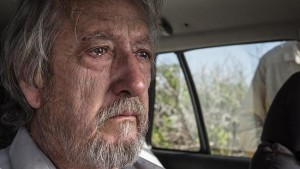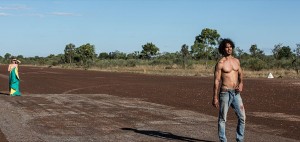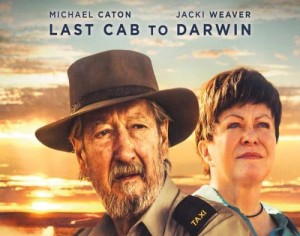In this era of big movie expense budgets and the often illusory allure of international sales comes a film that is true to its roots; Last Cab to Darwin is an unashamedly Australian firm and one for embracing.
Based on a play by Reg Cribb, in Broken Hill, Rex (Michael Caton) has stomach cancer that has recurred which suggests his days are numbered. On hearing on the radio about Dr Farmer (Jackie Weaver) promoting a painless death through euthanasia now allowed in the Northern Territory and faced with his friends’ ambivalence to his realities, Rex takes off in his cab for Darwin.
Along the way he teams up with Tilley (Mark Coles Smith), a young aboriginal guy on the drift and then in Daly Waters, Julie (Emma Hamilton), a British nurse and current backpacker. Together their road trip ends in Darwin when Rex meets up with Farmer to plan his death, an outcome that has more complications than he realised were going to come into play.
 Caton gives the best performance of his career; it is one at ease with the weariness of a lonely life and the pain of his disease. His love interest in Broken Hill (if that is what one should call it), Ningali Lawford-Wolf is great also as Polly, the woman denied what might have been but still deeply affected by the man who has left her physically but left her also with both his house and his dog. Coles Smith as Tilley is a shot of life with looks and charisma to burn that charms and warms in equal measure. Hamilton is the outsider who knows when duty calls and does what is required to help Y with a touch that combines both the professional and the humane.
Caton gives the best performance of his career; it is one at ease with the weariness of a lonely life and the pain of his disease. His love interest in Broken Hill (if that is what one should call it), Ningali Lawford-Wolf is great also as Polly, the woman denied what might have been but still deeply affected by the man who has left her physically but left her also with both his house and his dog. Coles Smith as Tilley is a shot of life with looks and charisma to burn that charms and warms in equal measure. Hamilton is the outsider who knows when duty calls and does what is required to help Y with a touch that combines both the professional and the humane.
With some surprise, Jackie Weaver is somewhat the fish out of water in all this. Her Dr Farmer lacks the empathy we might expect of a medical practitioner, even for the self-promoting schemer she portrays. Whether Weaver is off her game here or the script at her disposal is a bit lame, neither that wig nor seemingly the botox help the performance.
 Last Cab is beautifully filmed by Steve Arnold, especially the hike from the Hill to Daly Waters; the characters resonate a certain oneness with the landscape and the dose of old Aussie hits that open the film gets the dopamine pumping.
Last Cab is beautifully filmed by Steve Arnold, especially the hike from the Hill to Daly Waters; the characters resonate a certain oneness with the landscape and the dose of old Aussie hits that open the film gets the dopamine pumping.
Perhaps the film struggles once it gets to Darwin; the story gets diffused somewhat – and the return journey is a massive stretch of the imagination given what were most convincing ‘nigh unto death’ moments in Darwin. But there is a certain courage in its depiction of the indigenous world that deserves recognition and its eschewing of any attempts to dress the film up for an American market is admirable.
This is our best film since or in the same category as Bran Nue Dae; a road trip and love story combination with a difference. Do take the ride in this Last Cab.



Recent Comments